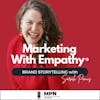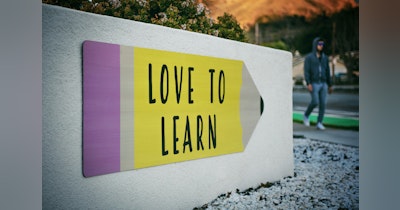How are you leveraging CSR amplifiers and PR-able experts to advance influencer marketing results? Sarah shares the final two categories of influence marketing brands can leverage + offers questions to help you understand your influencers. Summary and full transcript below.
THIS EPISODE AT-A-GLANCE
- Sarah's experiences with influencer marketing
- Who & what is influence (no r) marketing?
- What are CSR amplifiers?
- Questions to ask - understanding your CSR amplifiers
- Who are PR-able experts?
- Questions to ask - understanding your PR-able experts

Full Podcast Transcription
Sarah Panus:
When you realize an influencer is just someone who influences your audience, it opens up the realm of possibility for how you create your influence marketing plans and who you tap as influencers. For example, how are you leveraging your CSR partners and PR experts?
Sarah Panus:
Hi, my name is Sarah Panus. I have spent the last two decades driving digital content for billion dollar brands. Now I help content marketers build winning brand storytelling strategies and reduce feelings of overwhelm and confusion. Join me as we discuss strategy, creativity, confidence, and building a better connection with your audience. Think of this as a creative content marketing jam session mixed with chicken soup for the soul. This is the Marketing With Empathy Podcast.
Sarah Panus:
Hey, Hey, kindred speakers. Welcome back to another episode of the Marketing With Empathy Podcast. I'm so thankful that you are here and if this is your first time, welcome to the show. So today I'm gonna talk about, um, I'm gonna continue a conversation I've been having on this show regarding influence marketing plans. And based on my experience leading influencer marketing programs for very large brands throughout my career, the last 20 years, I've outlined like six categories of influencers that brands can leverage. Every category is not right for every brand. Um, it really just depends, but I want to help expand the thinking around influence marketing. Because I think a lot of people think of influencers and they think of one thing, usually they'll think of social influencers or celebrities. Um, and influencers is so much more than that. So I've already spoken about social creators and your customers. Two of my categories of influence marketers. And the third category I define, is what I call A-listers and celebrities. So that's the third. And the final two categories that I'm gonna discuss today, are what I call CSR amplifiers and PR-able experts.
Sarah's EXPERIENCEs with influence marketing
Sarah Panus:
So, as I've shared before in this show, my first experience with influencer marketing was earlier in my career when I worked on the agency side. Um, helping develop influencer capabilities at an agency that I worked at in Boston back in like the early 2000's. And at that time influencer marketing was a relatively new term that marketing teams were considering and talking about. And I remember working on this huge influencer program for a major bottled water company to support the launch of a new health water that targeted women. And we first wanted to tap into influencers as a thought leadership group to give us feedback on the product. And then if they liked it, tap into them to help spread awareness around the new health water with their communities. And it was a very large mass influencer approach. Um, where we literally found thousands of influencers who shared their feedback with us on the product with the brand, and then notified us of like collaboration opportunities, like sponsoring large events that we wouldn't have like known about otherwise.
Sarah Panus:
Um, some became PR spokespeople for us, others, you know, to answer reporter questions about like the health aspects of the product. And then that first group referred us to others and then the program grew into tens of thousands of influencers across the country that had influence in their network, in the health and wellness space. And to this day, that definitely remains the largest organized influencer program that I've personally worked on. And, you know, later in my career, it really, um, changed. And most of my experience lately has been around much smaller programs. Um, revolving around like focusing on a handful of influencers like hand picked to build really meaningful long term, bigger scale, um, relationships with and activations with them, you know, throughout the, of course of a full year. And then I've also spent a lot of time tapping into brands existing customer loyalty programs to drive engagement, advocacy, and referrals, you know, across all of your existing customer base.
Who & what is influence marketing?
Sarah Panus:
Cuz as I talk about in a previous podcast episode, customers are a huge influence, um, for your brand. Your customers, your existing folks are the ones that are referring and repeat buying and donating their time or services, etc. to your brand. And so I love working with like the customer side of it and thinking about how your storytelling content can engage them. How you can include them in your storytelling content as well, it's like a beautiful cycle. So neither approach is better than the other, it just really all depends what you're trying to approach. And as I shared way back on episode seven, an influencer is anyone who influences your audience. It can be anyone, I'm gonna repeat it again - An influencer is ANYONE who influences your audience. That's the definition of influence marketing. I talk about it with Jason Falls on a previous and his book Winfluence, um, on a previous episode.
Sarah Panus:
So, you know, for example, it can be the mom next door, your employee, a social influencer, a celebrity, the CEO of an organization, owners of your product, your customers like I just talked about. Any group of people that your audience listens to, is inspired by and trusts. That's an influencer by definition. So when a brand asks me if influence marketing is right for them, I will always say yes because I think influence marketing is right for every single brand. Because aren't we all trying to influence our audience? It just really depends what kind of influencers are right for your brand. Um, because not all types of influencers are right for every brand. So, you know, I've said it before and I'll say it again. That influencer are 100% right for your brand as long as you're focusing on influencers who actually influence your audience. So that's why I believe influencer marketing is always going to be important for brands. And I just don't see a day when companies are stopped trying to spread word of mouth about how great they are and what they can do and you know why you should purchase them and invest in them. So after this quick commercial break, I'm gonna dig into the final two categories of influencers. As I define them, which are CSR amplifiers and PR-able experts. So stick around.
Commercial Break
Sarah Panus:
Get ready to create a rockstar content team at your corporation. Today's episode of Marketing With Empathy is brought to you by my Brand Storytelling Academy. Brand Storytelling Academy is an intimate five month group training program designed to help internal B2C and non-profit teams attract top funnel leads to drive bottom funnel results. For one-third of the cost to hire a person on the team or onboard a high level storytelling strategist, up to five people on your team can be developing and accelerating their brand storytelling skills. Learn to humanize your brand to connect with your audience, develop confidence in brand storytelling skills, frameworks, and strategic mindset needed to advance in your career and enjoy your job more. Seven X new and repeat engagement through empathy plus data-driven storytelling and improve your existing team strategic skills without having to hire more people. Think of it like a college certification program for your team, but you get the knowledge a lot quicker. And your professor, me, has 20 years of hands on experience in the field. In addition to hearing from me, I'll have guest experts join and each week you'll also connect and learn from other brand marketing professionals in the group. Curious? Fill out the application at kindredspeak.com/apply to learn more and I'll be in touch to discuss if it's a good fit for your organization. Go to kindredspeak.com/apply.
What are CSR amplifiers?
Sarah Panus:
Okay, we're gonna jump right into it. Today's gonna be a quick, quick one for you guys. So CSR amplifiers is what we're gonna start with first. So CSR stands for corporate social responsibility. This is your, the causes that your company cares about, donates to, fundraisers for, you know, volunteers toward. CSR amplifiers are partners, um, you know, outside of your organization that you can tap into but there's teams internally inside of your organization as well, depending on how your two team is structured. So for example, when you're thinking about CSR partners - Who is the president or who's on the board of directors at the cause you support? Who's your main person over there? Who's their main spokesperson? Is there a way you can leverage and tap into that person, those people who have influence? How can you partner with them to amplify your brand messages with their audience?
Sarah Panus:
You know, a lot of times when you're doing, um, CSR work, as it should, you are focused on supporting that cause. But I think a lot of times brands think of just like the one way communication conversation part of it, which is like the brand helping the nonprofit, um, or the cause. But it goes both ways because that cause, that nonprofit, that organization and entity that you're supporting also has its own whole ecosystem of people and networks as well that you can tap into. So this could be, you know, emails that they send out to their database. Uh, a newsletter that they have, maybe they have an online portal that they share content with their other partners through that you could become a part of. Um, helping spread word of mouth about your products by offering them to the employees of the cause to create advocacy and future customers through their own employee base.
Questions to ask - understanding your CSR Amplifiers
Sarah Panus:
Um, it also involves like truly treating this CSR partner, like as a member of your team versus thinking of them as like something just off to the side that your company does. And what I mean by that is I want you to think about the resources that this, um, CSR company has. You know, like I said, who are their experts? What are their communication channels? Do they have, that you can co-share your messaging and your company's storytelling through? And how do you build that as part of your influence marketing plan to say, we're gonna tap into and expand because they have amazing, um, influence with their network or they have amazing influence in this area or with this other, um, a lot of times another nonprofit or another group or another board or things that you can tap in through. So as a brand, you're spreading awareness about this CSR cause, but how can the CSR brand also spread awareness about your brand?
Sarah Panus:
Um, that's what I mean when I talk about CSR amplifiers. Don't leave it as a one-sided conversation or think of it as an offshoot, there's influence marketing potential here that you don't want to ignore. They have huge influence with their audience of supporters and they also can open up a lot of doors and a lot of conversations with very other influential people that maybe would not have been as open to speaking with your brand before. So if your company has a CSR initiative, add it to your influence marketing plans this year, and think about it and talk with the team that manages that partnership to how you can fold them into your influence marketing plans.
Who are PR-ABLE experts?
Sarah Panus:
Okay. And then the, the next category, my final category, I call PR-able experts. PR as in public relations. So what are PR-able experts? Well, I call 'em this because these are people, your PR team could pitch to the media and the media would wanna interview them or get quotes from them for like an earned story. As I've learned in my career, not every influencer is pitchable to the media. The media, usually in my experience does not want to speak with social influencers. A, um, they're just not credible enough, um, or have the background that they want to quote in a story. A big YouTube influencer isn't necessarily gonna be the right credible source, right? That your, your local TV news station is gonna be interested in or a big national magazine and their online publication is looking for.
Questions to ask - understanding your PR-ABle experts
Sarah Panus:
The influence filter, you wanna ask yourself here is, um, kinda like three things. One - you wanna ask yourself if this is right for you, is do we want earned media coverage to expand this message or this initiative? Cause if you do then PR should be a part of your plan. Two - then what topic is this expert influential in and does that align with what our brand is trying to talk about? That'll help you find out, um, you know, the right person. And then three - is this person someone our PR team can pitch and secure interviews with. And ask your PR team. Don't assume, ask them. They will have an opinion based on their experience if you're not on the PR team. Um, just because there's nothing worse and someone be like, "oh yeah, the PR team can just pitch this out". And it's not like, you're like when you're on the PR team, you're like, this is not happening. Like nobody's interested in, um, that has happened. But generally from my experience, PR-able experts tend to be, um, doctors, leaders, um, people who are doing research, like the background backend founders of certain things, right? Like there's a different angle with the media that will get them interested, um, in wanting to speak with them.
Sarah Panus:
And so that is another angle that you can think about because then you think, earned media coverage is hugely valuable in terms of others who can read story and hear the expertise that's being shared from your brand through your spokesperson. You know, who is speaking on behalf or speaking about the work that your company is doing, but in a, in an editorialized way. Um, there is, you know, influence and reach there in terms of, um, the others, anyone who's chiming in and wanting to read those publications or watch that video. So that's it, like that's, that's it for today's episode, super short and sweet. But I wanted just to give you my final two categories and I hope that this really helps expand your thoughts around these two additional categories that you can add to your influence marketing plans this year. So CSR amplifiers and PR-able experts. I'll see you back here next week everyone. Until next time, kindred speakers.
Closing RemarkS
Hi fives for finishing another episode. When faced with an obstacle, you’re the type of person who gets better instead of bitter. I hope you feel creatively inspired and invite you to check back often for more goodness from me and my guest. If you want more actionable advice and inspiration head over to kindredspeak.com for show notes, all discount codes from today's episode, and to sign up for my newsletter. Subscribe now to the Marketing With Empathy Podcast on Apple podcast, Spotify and wherever else you get your podcast. And if you'd be so kind, will you please leave me a review. This helps my podcast get noticed by others. Keep smiling.
More focused and aligned brand storytelling marketing strategy is right around the corner
If you’re looking for a quick brand storytelling framework template to plug and play, I’ve got your back. I created this affordable PowerPoint template, with the above five essentials, to help you easily and quickly create your own brand storytelling framework. All you have to do is follow the prompts, update with your brand’s info, and bam—you have your own brand storytelling framework to follow and use for team alignment. LEARN MORE
ABOUT SARAH PANUS
Sarah Panus is a brand storytelling marketing strategist, Minnesota mom, and owner of Kindred Speak, LLC, a remote consultancy that helps corporations attract upper-funnel leads that drive bottom-funnel results through storytelling. Her mission is to add value to the world by humanizing brand+consumer connections. Her online courses teach content professionals inside corporations think like Editorial Directors for their brand to drive stronger results while enjoying their jobs more. She’s spent the last 20 years helping brands including Sleep Number, Starbucks, Nestle Waters, Christos Bridal, Game Crazy, Cone Inc, and others, speak a kindred language with their audiences, driving brand advocacy and millions in revenue and brand engagements. Learn more at www.kindredspeak.com. Follow Sarah on Instagram and LinkedIn.







